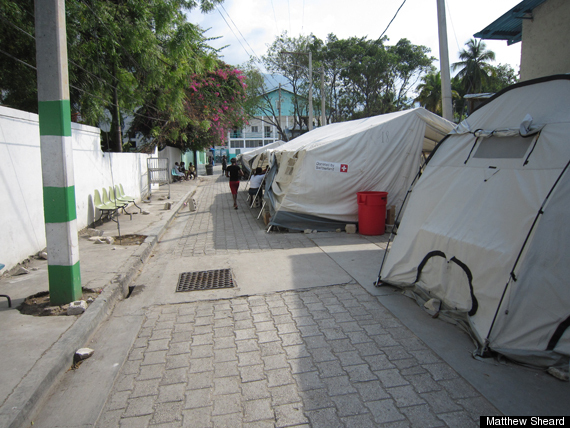 General Hospital in Port-au-Prince is a gated compound. The buildings that weren't destroyed have been cleaned out and are being used, in part. But most of the work is still being done in tents, set-up around the compound by a wide array of NGOs.
General Hospital in Port-au-Prince is a gated compound. The buildings that weren't destroyed have been cleaned out and are being used, in part. But most of the work is still being done in tents, set-up around the compound by a wide array of NGOs.
Patients wait on benches, under a tarp canopy, to see the triage nurse, an American who works through a translator. Then the patients wait on another set of benches to see a nurse or medic. If it is not a serious injury/complaint (rash, flu, laceration) the nurse or medic checks with a doctor verbally before treating and then discharging. Patients with minor complaints are treated right in the triage area where they wait. Under the tarp canopy in the midst of the mid-day heat. If a patient presents with a more serious case (seizure, gunshot) they are taken into the ER tent and treated by the RNs and MDs.
Our group split into teams of two and went to different tents in the Hospital. Robinson, a BSVAC EMT who had already been in Haiti working at the Hospital for a week when we arrived, showed us around the compound and divvied us up into different areas.
 Inside of the pediatric tent a woman was pleading with the Nurse on duty. She held her 4 day old preemie in her arms. Robinson and I put the baby on oxygen and checked his pulse and respiratory rate. The Nurse radioed the pediatric doctor and gave a report.
Inside of the pediatric tent a woman was pleading with the Nurse on duty. She held her 4 day old preemie in her arms. Robinson and I put the baby on oxygen and checked his pulse and respiratory rate. The Nurse radioed the pediatric doctor and gave a report.
Two doctors arrived after a few minutes and asked us to weigh the baby. "If it's more than 2 kilograms there is a chance. But otherwise I would say it's not very likely the baby will survive," said a male doctor wearing a Zanmi Lasant vest. The other Doctor, a red-headed woman with an eastern European accent named Caterina helped make arrangements to take the baby to the NICU.
Robinson and I returned to the Triage tent, leaving some of our group in Pediatrics. Robinson speaks Creole and he is on his second Volunteer trip to Haiti. So I basically acted as his assistant.
The second patient we treated was a 40 year old man who had tested positive for TB, had asthma and was complaining of difficulty breathing. We gave him two nebulizer treatments. But because there is no isolation area in the ER tent, the patient had to take the treatment outside of the ER tent. Sitting on a broken wheelchair in the mid-day sun.
After a couple of hours treating patients in the ER, Robinson and I took a water break. We walked over to the supply room to get bottles. After cooling off in the shade for a couple minutes we saw Caterina again. The doctor who had taken the premature baby to the NICU. She told us the 4 day old baby died shortly after getting to the NICU.
"I went to check up on him and he was cyanotic. I ventilated and gave adrenaline, I did what I could but he just couldn't make it. Thank you for your help."
The local and international medical workers here in Haiti are performing miracles every day. But the resources aren't adequate. The Nurses in my group agree that if that baby had been in the US he probably would have lived. He died from poverty and lack of medical care. Not because he was premature.